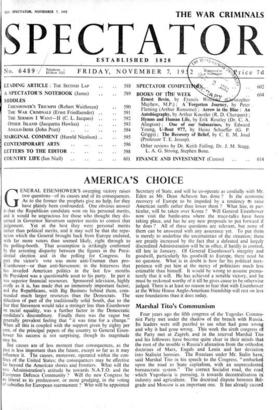AMERICA'S CHOICE
GENERAL EISENHOWER'S sweeping victory raises two questions—of its causes and of its consequences. As to the former the prophets give no help, for they have plainly been confounded. One obvious answer is that the Republican candidate won on his personal merits, and it would be ungracious for those who thought they dis- cerned in Governor Stevenson superior merits to contest that judgement. Yet at the best they were personal merits rather than political merits, and it may well be that the repu- tation whiCh the General brought back from Europe endured, with far more voters than seemed likely, right through to the polling-booth. That assumption is strikingly confirmed by the arresting disparity between the figures in the Presi- dential election and in the polling for Congress. In part the victor's vote was more anti-Truman than pro- Eisenhower—or than anti-Stevenson; in the bitterness that has invaded American politics in the last few months the President was a questionable asset to his party. In part it was superior financial resources. Sponsored television, highly costly as it is, has made that an immensely important factor; and the Republicans, with Big Business behind them, com- manded much larger resources than the Democrats. The defection of part of the traditionally solid South, due to the fear that Stevenson would take a stronger line than Eisenhower on racial equality, was a further factor in the Democratic candidate's discomfiture. Finally there was the vague but generally prevalent feeling that " it was time for a change." When all this is coupled with the support given by eighty per cent. of the principal papers of the country to General Eisen- hower his success is not surprising, though its magnitude may be.
But causes are of less moment than consequences, as the past is less important than the future, except so far as it may influence it. The causes, moreover, operated within the con- fines of the United States; the consequences' may be effective far beyond the American shores and frontiers. What will the new Administration's attitude be towards N.A.T.O. and the European Defence Community ? Will the new Congress be as liberal as its predecessor, or more grudging, in the voting of subsidies for European rearmament ? Who will be appointed Secretary of State, and will he co-operate as cordially with Mr. Eden as Mr. Dean Acheson has done ? Is the economic recovery of Europe to be impeded by a tendency no raise American tariffs rather than lower them ? What line, in par- ticular, will be taken over Korea ? Will General Eisenhower now visit the battle-area where the truce-talks have been taking place, and has he any new proposals to put forward if he does ? All of these questions are relevant, but none of them can be answered with any assurance yet. To put them is merely to underline the uncertainties of the situation; these are greatly increased by the fact that a defeated and largely discredited Administration will be in office, if hardly in control, till late in January. Of General Eisenhower's integrity and goodwill, particularly his goodwill to Europe, there need be no question. What is in doubt is how far his political inex- perience will put him at the mercy of politicians much less estimable than himself. It would be wrong to assume prema- turely that it will. He has achieved a notable victory, and he must be reckoned worthy of it till he gives cause to be otherwise judged. There is at least no reason to fear that with Eisenhower at the White House Anglo-American friendship will rest on less sure foundations than it does today.


































